A Way of Being Free Read online
Page 9
97
All great stories are enigmas.
98
Humility is the watchword at creativity’s gate.
99
Creativity is a form of prayer, and the expression of a profound gratitude for being alive.
100
Ah, the sweet suffering of creativity.
101
Politics is the art of the possible; creativity is the art of the impossible.
Redreaming the World
For Chinua Achebe
The ancient Romans built straight roads wherever they went. Christians planted churches on resistant landscapes. Muslims pierce the air with the call of the muezzin.
Conquerors are transplanters. So are the conquered and exiles. They take their earth with them, carry with them their rituals as codes of continuity in the new world. But the oppressed always find themselves in paradoxical waters that both show up their presence and render them invisible.
Those who dream of dominating the world should expect the world to overrun them. To impose your will on another is to surrender the right to your own space. To swallow the history of others into your own history is to expect to be constipated with the history of others.
In their over-reaching, colonisers always become transparent. Their language hides nothing. The oppressed always understand what is being said. World-dominators have no secret language in which to hide. The oppressed retain the moods of their languages. They are always opaque.
The oppressors become so inflated with their history, their apparent stability, and their military power that they forget how to listen to and how to see others. In the face of inscrutable time, they seem to flourish in this hubris. They forget that the world is one, and that the fates of oppressed and oppressor are bound up with one another for ever.
The future of all is jeopardised by the egotism of contemporary victors.
The oppressed always live with death. They die in life. Suffering drenches them in mystery. Intense experiences accelerate their ageing. They mature more strangely and more deeply than their oppressors. And yet they often think of their victors as their standard of aspiration. Lack of historical confidence leads them into this bifurcation of thinking. They have not as a people learnt how to snatch historical confidence from the most unlikely places, from the fact that they are still here on this planet, inhabiting some sort of space, that they often survived slavery and all manner of outrages, drought, famine, dictatorships, bad governments, bitter wars, mass imprisonments and other permutations of human viciousness. They many be dwindling but it is precisely because of all they have suffered and are still suffering that they have much to struggle for, to be alive for, beyond the mountains of their crisis.
The dreams of the oppressed are planted in the earth and watered through all the bitter seasons. Their suffering could make them farmers of dreams. Their harvest could make the world more just and more beautiful. It is only the oppressed who have this sort of difficult and paradoxical potential.
It is an enigma. Those who suffer are always in that place that binds roots to the earth. They are also always in exile. Suffering is their centre, their heart. It reminds them of who they are. The oppressed live within the stomach of their oppressors. They need the thinking and the structure of their oppressors to transform their realities. The oppressors need the blood of the oppressed for the rejuvenation of their spirits. The spirits of all become weirder.
It would seem that the oppressor is the challenge of the oppressed. It would seem that the oppressed have to accept the standards of their age, have to meet them, and raise them higher, add their genius to the universal dream. It would appear that they have to compete in this world, but not necessarily on the sullied terms of the world dominators. They have to fight for their places in the modern proscenium. They can no longer, it would seem, hold themselves down with rage about their historical past or their intolerable present. But they have to find the humility and the silence to transcend their rage, distill it into the highest creativity and use it to reveal greater truths.
They have to regroup their powers and build again from the wedding of the best things the world has to offer and the best aspects of their own mythic, aesthetic, spiritual, and scientific frames. They mustn’t forget that distance and their sufferings help them to see better what sort of future they want to create. With humility and with passion they could learn from the world and teach the world to learn from them. Along the way it is necessary to clear the cobwebs of bewilderment from their eyes, and to demystify the propaganda of the contemporary victors.
The contemporary victors in the abundance of their economic constellation are also spinning in a curious stasis of spiritual and cultural life. They have forgotten death. They are blind to the monsters of unresolved history lurking in the cellars of their modern dreams. They have forgotten the inescapable inter-connectedness of all things. In arrogating to themselves the centre of the world, when in fact the centre is everywhere, the contemporary victors are speaking to the universe on behalf of everyone and speaking badly. It is time now for them to listen, and to listen the way human beings have never listened before. It is time to listen to the speech of poisoned dolphins, the cries of the stratosphere, the howls of the deforestated earth, the caterwauling of the dry winds over the encroaching deserts, the screams of people without hope and without food, to the silences of strangled nations, to the passionate dreams of difficult artists, and to the age-old warnings that have always lurked in the oral fables of storytellers and shamans.
It should no longer be left to the contemporary victors to speak for human history. Whatever resilience has kept wounded people and devastated continents here, alive, can be transfigured to make them strong, confident, and serene. They have to question everything, in order to rebuild for the future. They have to redream the world. Chinua Achebe put it very succinctly when he wrote that suffering could also give rise to something beautiful.
It is possible that a sense of beauty, of justice, of the inter-connectedness of all things, may yet save the human species from self-annihilation. We are all still learning how to be free. Freedom is the beginning of the greatest possibilities of the human genius. It is not the goal.
The real quarrel of the oppressed is not with the oppressors. It is with themselves. The real truth they have to face is the truth about themselves. Hope and striving have magic in them. Those who have much to strive for, much to resolve and overcome and redream, may well be luckier than they think. Struggle is life. And there is something awesomely beautiful and history-making about those who have set out to climb the seven mountains of their predicaments, towards the new destinies that lie beyond, with the star of hope above their heads.
For in their patience and in their egalitarian triumph they can teach us all how to live again and how to love again and could well make it possible for us all to create the beginnings of the first truly universal civilisation in the history of recorded and unrecorded time.
We hope you enjoyed this book.
Head of Zeus are proud to be reissuing a collection of Ben Okri’s best works alongside his brand new novel, The Age of Magic:
Dangerous Love
In Arcadia
Astonishing the Gods
A Way of Being Free
Ben talks about the collection here.
For an exclusive preview The Age of Magic, read on or click here.
~
Ben Okri
More books by Ben Okri
An invitation from the publisher
Ben Okri on the Reissues
It is for me a conjunction no less than magical that these five books are coming out together. The four reissues were first published in the nineties and in the early years of this century. They were all published within a few years, in one house, under the aegis of Anthony Cheetham, and are being re-published now, in a cluster, in another house, under Anthony’s aegis. There is a kind of synchronous harmony to this, a kind of perfect circularity that is
both satisfying and auspicious.
As a body of work, the four books link with each another in an unusual way. Each explores, from a different angle, the themes that are central to my writing. They are about the nature of reality, storytelling, enchantment, history, art and love. In each of these books I attempt something different. Astonishing The Gods is a short novel, written in a mode of enchantment, a kind of fable about visibility and invisibility, about ideals and ideas, and about the poetry of being. It was a major departure in my writing at the time it was written and remains one of my favourites. A Way of Being Free is a favourite with many of my readers, a book of semi-poetic essays on art, politics, storytelling, and creativity. I had been writing these private and public meditations since the eighties. They have been widely referenced and still remain much quoted online.
In 1996, The Landscapes Within, a novel written when I was in my twenties, was transfigured into Dangerous Love. This is a story about love and art, but also about the aftermath of the Nigerian Civil War – corruption, a lost generation, and a search for an artistic language with which to express the true nature of reality. It is a kind of twin to The Famished Road and many readers think it more accessible.
And then in 2002 came In Arcadia, a novel unlike any I had written till then, exploring the anomie of our times, travel, the quest for a salve for the anxious spirit of our age. It is also about television and the shadow of power.
Four different books radiating from an unmistakeable core. Readers who only think of me as the author of The Famished Road have a pleasant surprise coming. The four books look at poverty and the quest for happiness. They look at beauty and ugliness. They deal with the world of the real and the world of the fabulous. They look at Africa and they look at Europe.
What unites them all is an abiding sense of the mystery of life and the magical nature of storytelling. My writings are enchantments, even when they deal with difficult realities; because for me it is not the realities that define us, but the consciousness with which we experience and face them.
The Age of Magic is the novel leading the procession into the world. For more than twelve years these four books have dwelt tenderly in the underworld. That their reincarnation is heralded by the birth of a new novel is entirely fitting. The Age of Magic is my first novel in seven years. That these five books are published by Head of Zeus is cause for celebration, cause for contemplating, with a sense of wonder, the nature of fate, and what charming bounties it promises.
Ben Okri
July 2014
Preview
Read on for a preview of
‘The Age of Magic has begun.
Unveil your eyes.’
Eight weary film-makers, travelling from Paris to Basel, arrive at a small Swiss hotel on the shores of a luminous lake. Above them, strewn with lights that twinkle in the darkness, looms the towering Rigi mountain. Over the course of three days and two nights, the travellers will find themselves drawn in to the mystery of the mountain reflected in the lake. One by one, they will be disturbed, enlightened, and transformed, each in a different way.
An intoxicating and dreamlike tale unfolds. Allow yourself to be transformed. Having shown a different way of seeing the world, Ben Okri now offers a different way of reading.
A work of art that retraced the conquest of happiness would be a revolutionary one.
Camus, Noces (1937)
The age of magic has begun.
Unveil your eyes.
Pensero, Il Camino (1321)
Book 1
The Journey as Home
1
Some things only become clear much later.
2
They were on the train from Paris to Switzerland when the white mountains and the nursery rhythms of the wheels lulled him to sleep. He found himself talking to a Quylph.
‘What are you afraid of?’ it said.
‘Why should I be afraid of anything?’ Lao replied.
‘Maybe you are afraid of Malasso?’
‘Why should I be afraid of him?’
‘Everyone else is.’
‘I don’t know him.’
‘People are afraid of what they don’t know.’
‘Never met him. Why should I be scared of him?’
‘You tell me.’
Lao became aware, out of the corner of his eyes, that everything seemed luminous. In a compartment full of businessmen, tourists, and young lovers the Quylph looked perfectly at ease. This bothered Lao.
‘Then it must be life you are afraid of,’ the Quylph said after a while.
There are some conversations so strange that they are only remembered much later, but not noticed at the time.
The Quylph, in a unique space, occupied the seat across from Lao. He felt lucky to see it.
With a hint of amusement, it said:
‘Do you know what the luckiest thing is?’
‘No.’
‘It is to be at home everywhere.’
Outside the window the mountains changed from white to green.
‘You may see me again later,’ smiled the Quylph. ‘But don’t look out for me.’
‘Wait! I want to ask you a question.’
‘You had your chance,’ the Quylph said with an expression at once malicious and droll. ‘Be more awake next time.’
3
Lao slept in a shining orb. He woke up at his table, with a book on his lap, and the world was different. The jagged mountains raced past the large window. Mistletoe was asleep with a smile on her face. At that moment Jim, the director of the documentary they were making, appeared in front of him.
‘We need to film you interviewing your fellow passengers.’
Lao stared blankly at Jim’s benign jowled face. He was still trying to decipher the inscription that was the Quylph and his hearing was slow.
‘Are you all right?’ Jim said.
‘Fine! Great! When do you want me?’
‘Whenever you’re ready.’
‘I’m ready now.’
It turned out that Jim wasn’t. He had figured Lao would give him trouble for about thirty minutes, which would have given Sam, the cameraman, enough time to finish his shots at the other end of the train. Jim had expected Lao to be difficult, and was a little annoyed that he wasn’t. On the whole, Lao thought, we don’t like people changing on us. It means we have to change too, and we dislike making the effort. We prefer them predictable. Jim stood there not knowing what to do. Lao sat back down, and Mistletoe woke up.
‘Come get me when you are ready,’ Lao said.
‘I’m ready,’ said Mistletoe.
‘Okay,’ said Jim, leaving reluctantly.
‘Not you,’ Lao said, squeezing Mistletoe’s hand.
4
They were making a television documentary about a journey to Arcadia, in Greece. In those days seven people were needed to film such a journey. They had started in London and had filmed in Paris and were now bound for the Goetheanum in Basel, Switzerland. Along the way they were filming travellers, asking what their idea of Arcadia was, what their ideal of happiness might be. They were making a journey to a place, but in truth they were making a journey to an idea.
There were eight of them: seven involved in the filming, and Mistletoe, Lao’s companion. The journey which began as a documentary became one in which, against their wills, they were being changed.
5
While he was waiting, Lao began thinking of the persona he would adopt. He conceived of life as a game in which one gets to play many roles and have many personas. He thought it best not to be too hung up on consistency. Only the dead are consistent.
The imp of impersonation came over him. He thought about how the camera makes one fall in love with an image of oneself, and perpetuates a false reality. What if by sheer repetition we become the person we most often pretend to be? Does that mean there is no authentic self? Are we made of habits, compressed by time, like layered rocks?
These questions turned in his mind as he pre
pared to meet the travellers he was to interview. His mind was unclear.
6
Husk, who was in charge of all logistics of filming, came over to fetch Lao. She was thin and efficient and neurotically beautiful in her floral dress. She had already scanned the passengers for suitable candidates. The four people she chose were white, middle-class, American, and were travelling together.
She considered that, of the four, the lady who spoke with confidence was the ideal person to speak for the group. Husk thought she had the most interesting personality. She explained all this to Lao while they were standing between compartments, and she had to raise her voice because of the grinding of the wheels.
‘They’re a lovely group. I’ve spoken to them all. Just be calm. Are you sure you’re all right? You look as if you’re not quite here. The lady called Barbara is definitely the leader. She’s got great personality, as you’ll see. Are you sure you’re okay?’
From the beginning of the journey Husk had entertained doubts about Lao as the presenter of the film. She doubted he had the qualities required, doubted his grasp of the subject, and his character. Lao was aware of this, and of his reputation for being difficult, and it amused him.
‘I think so,’ he replied.
‘Just remember the one with personality,’ she said.
7
While they were waiting for Sam to set up the cameras, Lao thought about the nature of personality. He wondered how much of a role it played in the outcome of events. He wondered how much was possible, or failed to be possible, because of it. But what is personality, he asked himself? The general theory is that it is active, performed, and larger than life. But it seemed to him that personality is the outward presence of an inner accomplishment. It exerts its influence unseen, like the moon on the tide. It sways without knowing that it does. It is akin to talent or an innate gift. The strategies of Alexander, thought Lao, are a metaphor of his personality rather than of his calculation. History might be the story of personality acting on time and memory. Maybe, when we immerse ourselves in the genius of existence, Lao thought, personality can even overcome fate.

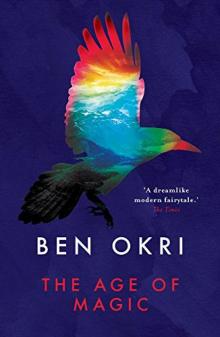 The Age of Magic
The Age of Magic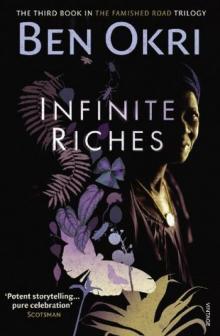 Infinite Riches
Infinite Riches Songs of Enchantment
Songs of Enchantment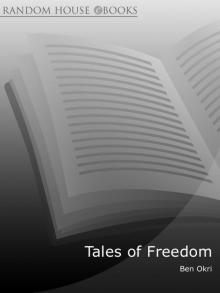 Tales of Freedom
Tales of Freedom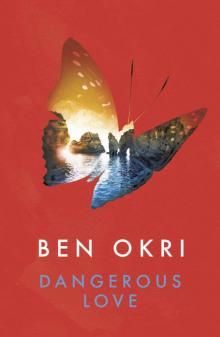 Dangerous Love
Dangerous Love Starbook
Starbook The Famished Road
The Famished Road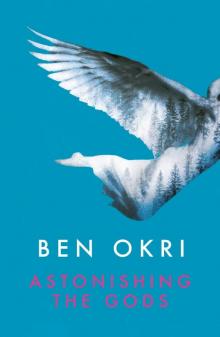 Astonishing the Gods
Astonishing the Gods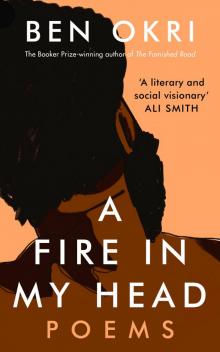 A Fire in My Head
A Fire in My Head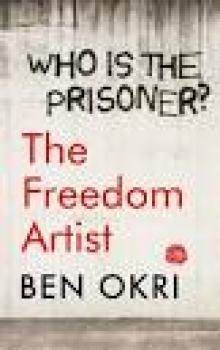 The Freedom Artist
The Freedom Artist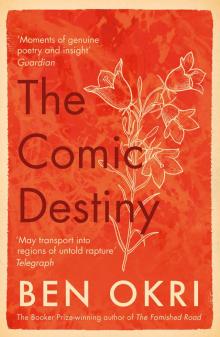 The Comic Destiny
The Comic Destiny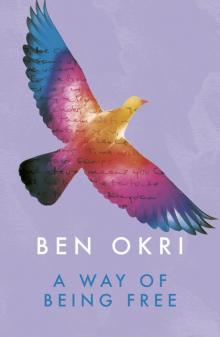 A Way of Being Free
A Way of Being Free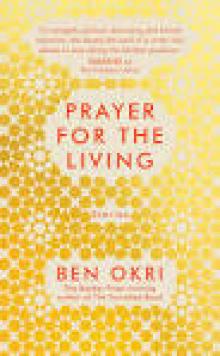 Prayer for the Living
Prayer for the Living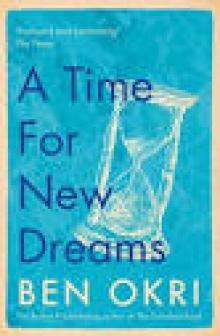 A Time for New Dreams
A Time for New Dreams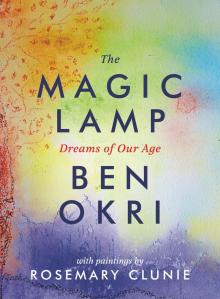 The Magic Lamp
The Magic Lamp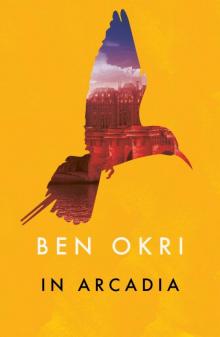 In Arcadia
In Arcadia